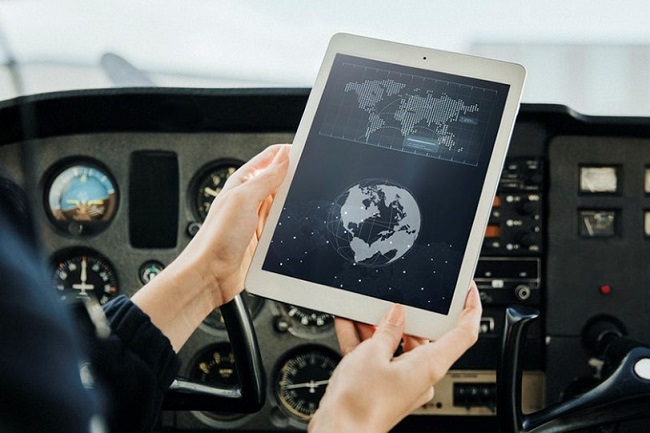By Howard Deevers
We live in the Technology Era, no doubt about that, and technology has made life easier for most of us, but who among us has not had an issue with our “computers”? We have computers, iPads, smart phones, and even smart watches that travel with us everywhere. If you leave your house without your cell phone, it is reason to turn around and go back to get it.
Technology has made its way into the cockpits of our planes. One hundred years ago, airplanes did not even have radios in them. The introduction of the “Direction Finder” was really high technology at the time. Now, the ADF/NDB systems are going away. The VOR was a big improvement in electronic navigation, and it is slowly being replaced by GPS.

Early radios and navigation aids were large, heavy, tube type, and prone to failure. Did you ever wonder why we have all of those regulations for “loss of communications” in our Instrument Ratings? It did happen frequently, but is much rarer today. Our radios and electronics are very reliable, with solid state circuits, but they can, and do, fail.
New technology is being developed so rapidly that the FAA cannot evaluate all of the new items to the standards that we would like before they are brought to market. That is not saying that the FAA is not doing its job; I’m just saying that technology is faster in coming than most of us can keep up with.
Battery powered cars are already on the roads, and aviation is experimenting with battery powered aircraft. In addition to weight, the limiting factor for batteries is the range. Most battery powered cars are limited to about 200 miles before they will need a recharge. Technology will exist in the future to recharge the cars as they drive, at least on the long stretches of interstate highways. The outer shell of the car will become a part of the capacitance and charging will be from a capacitance connection to electrical infrastructure built into the side of the roads. Failure of this system will be treated as a national disaster, just was we treat hurricanes and tornadoes now. That may be OK for cars, but don't look for that to be the savior in aviation any time soon.
Does this sound like the “George Jetson” cartoons that we saw many years ago? Sure does, but much of that is already with us, and more is on the way. At the Consumer Electronics Show in Las Vegas this year (brought to you by technology since there was no real show this year due to the pandemic), a company announced plans to have battery operated helicopters in use within a few years. These helicopters were described as being available on the roof tops of office buildings. You would not fly this helicopter, but it would take you to your next meeting across town, without you touching anything inside of the vehicle. You are only a passenger.

GPS changed everything. We have GPS receivers in our phones, our iPads, other devices and, of course, in the panels of our airplanes. There are rules for use for navigation under IFR conditions, but for VFR flight they are “nice to have” additions to the panels. IF you do have a GPS receiver in your panel, you may have to demonstrate your ability to use it on a check ride for a rating.
There are still many General Aviation airplanes flying that do not have a GPS of any kind in the panels. Many refer to these as “steam gauges” because they are round in appearance. The newest airplanes now come with “flat panel” displays that have all of the information you need located in one area. Instructors struggle with keeping up with all of the different manufacturers of these displays, since one size does not fit all. Each manufacturer has their own way to operate the electronics, so jumping from one airplane to another without training on the systems can be hazardous. For planes equipped with “steam gauges,” the transition from one to another was rather simple.
Transitioning to planes with high technology panels can be a problem. Probably the most famous example is the Boeing B787 MAX 8. After investigating two fatal crashes, authorities all around the world grounded the entire fleet of the MAX 8 aircraft. Boeing went to work to fix the problem, but it took many months to satisfy the FAA and the buyers of the aircraft.

Can something like that happen in General Aviation? Let's hope not. However, it is possible, and we need to be aware that electronics and technology can fail us at any time. The old school of “always fly the airplane” still applies. If equipment fails, turn it off and go back to basic skills. Technology can be and is often a great help to us, but we must be better than the technology that we use. Keep those flying skills sharp!
Accident investigators are not listing equipment in the panel during accident investigations. That might change. Some airplanes are now equipped with the “magic switch.” In the event of a severe emergency, such as the pilot being incapacitated, a passenger can operate that “switch” and the plane will find the nearest suitable airport, inform ATC, and land the plane safely without any input from the passenger. Does that sound too good to be true? Maybe, but it is a feature available on some newer airplanes now. How do you test that on an annual? Is it required to be tested on an annual?
There is little doubt that technology can assist us in many ways. “Terrain awareness” is probably one of the best. I have been alerted to terrain many times with my iPad and other GPS receivers. At night it is a blessing. Most of the time I was already aware of the terrain, but there were times that a notice showed up that I might not have been aware of. I have wondered if such technology could have prevented some of the accidents that we have read about where an aircraft impacts terrain at night? Would such a warning have prevented those accidents?
Keep your skills sharp with flying as often as you can, and train on the use of the technology in your plane, no matter how advanced or old it is. And don't forget to look for a Safety Seminar offered for free by ARIZONA PILOTS ASSOCIATION, and the FAASTeam. We hope to have those in person again soon.

